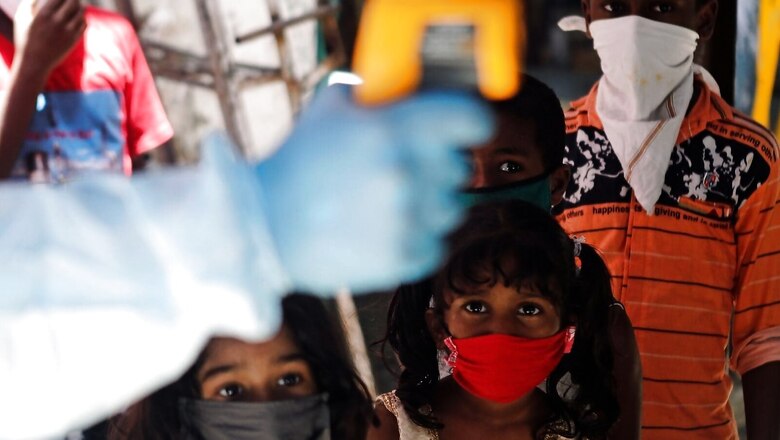
views
The fourth nationwide Sero Prevalence Survey of SARS COV-2 antibodies done by the Indian Council of Medical Research (ICMR) has revealed data, alerting about the upcoming multiple waves of Covid-19 and several observations on the current scenario.
The survey was conducted in 28,975 children in the age group of 6 to 17 years and 7,252 health care workers, following which the conclusions were drawn. The survey was conducted in 70 districts of 21 states of the country, 10 villages/wards from each district was first selected wherein 40 individuals per village/ward were marked. Hence a total of 400 individuals aged six years or above per district were examined, while 100 health care workers per district from district & sub-district hospitals were also selected for the survey.
According to the survey, a total of 62.3% are vaccinated out of which 89.8% are fully vaccinated (double dose). And 81% have taken the first dose of the Covid 19 vaccine and had antibodies. But of all this data, the eye-catching numbers are the ones of the health care workers who have not taken even one jab- around 10.5% of health care workers have not taken any vaccine, noted the survey. Several healthcare professionals were reluctant to take the jab initially, but their numbers continue even after seven months of the initiation of the vaccination program.
Parallely, 13.4% of health care workers have taken one dose and 76.1 % have taken two doses. The overall Seroprevalence (presence of covid antibodies) in the country is 85.2%. This means two-third of the general population have SARS-CoV-2 antibodies. But one-third of the population does not have antibodies yet and their number counts to around 40 crores which is not a negligible proportion. States, districts, and areas without antibodies run the risk of infection waves, alert the experts.
Children are stronger than expected
The survey pointed out that more than half the children in the age group of 6 to 17 years were seropositive. And there is not much difference in the population, sero-prevalence was similar in rural and urban areas both. This raises questions as experts say rural and urban populations will never have the same pattern. This is a national-level survey and it is not a substitute for local (state/district) variations, says the survey report.
The alerts of future waves and suggestions
The report clearly mentions state heterogeneity indicating the possibility of future waves of infection and hence suggests societal, public, religious & political congregations to be avoided.
Also, a major restriction on travel is suggested by the survey. Non-essential travels should be discouraged and travel should be allowed to only those who are fully vaccinated, highlights the report. It has clearly recommended to ensure full vaccination of all healthcare workers and accelerate vaccination coverage in vulnerable population groups. Also, ensuring adherence to non-pharmaceutical interventions and continuation of tracking Covid-infection in SARI cases in district hospitals along with identification of clusters and clinical severity is of prime importance, said the report.
Meanwhile, experts say the national serosurvey is general data and such surveys need to be done at state levels so that the antibody levels of the population and therefore further plans to tackle the next wave can be done in a more specific way.
Epidemiologist and Public Health Research Specialist Dr Sunil Kumar D R observes few prominent loopholes in the nationwide survey. “Several European countries are done with the third wave and are facing the fourth wave. But these countries have not seen the infection targeting the pediatric population. We can hence conclude that the third wave will have its impact on pediatric and adult populations alike. There is no proof that the target population is pediatric.”
Also, we can note the ICMR’s official statements which are contradictory in a span of 2 months. Initially, ICMR had warned the health sector to stay alert stating the third wave will affect children the most. But AIIMS chief Dr Guleria stated a few days ago that children are safe in the third wave as their immunity is pretty good and hence schools can be gradually opened.
However, until now, vaccination is done only for adults, even then, children have shown immunity that is on par with the adults. Hence, kids are stronger than adults with regard to immunity or antibody production. Also, there is no data to substantiate the high death rate in kids that calls for extra alertness.
There is a dire need for state-wise sero surveillance to be done. This is a nationwide survey and doesn’t address specific grass root situations. Also, after all these months of nationwide vaccine drive, a significant group of health workers not taking even a single shot of vaccine is a major risk to be considered. Dr Sunil Kumar suggests vaccines for healthcare workers should be made mandatory as they will be directly in contact with the patients and hence are at the risk of turning super spreaders if infected.
Which variant to fear?
We should also note that genomic sequencing is not mentioned in the report at all. Given the situation wherein various variants of the virus are making headlines and instilling confusion and fear among people, that information was very much needed. Delta, Delta Plus, Kappa and others are pointed out to be scary but where and how much is still unclear. State-level sero surveys along with data on variants and their presence will play a major role in tackling the forthcoming waves, opine experts.
Read all the Latest News, Breaking News and Assembly Elections Live Updates here.




















Comments
0 comment